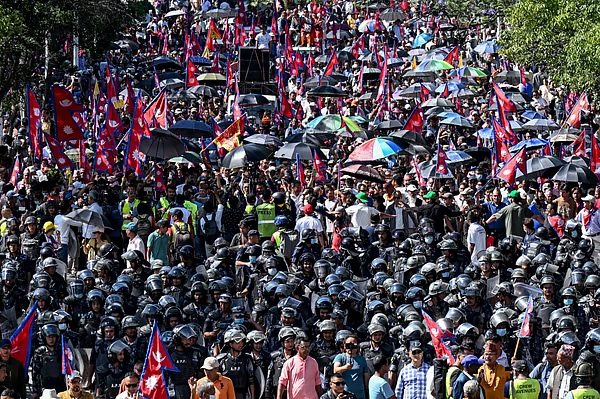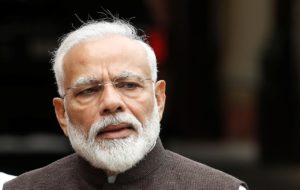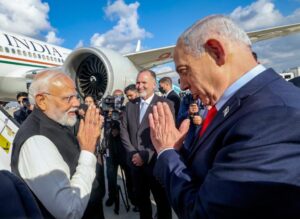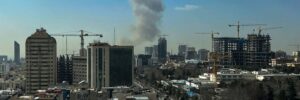Nepal Unrest: Warning Signals From Gen-Z To Netas And ‘Nepo Kids’

Nepal’s youth-led protests are more than just a local phenomenon; they are a wake-up call for the entire neighborhood. The demand for transparency, accountability, and genuine political reform is loud and clear. Politicians must listen and act, or risk facing the same fate as their counterparts in Nepal
The recent youth-led protests in Nepal against the entrenched political system and its leaders have sent a powerful message to the region, following similar movements in Sri Lanka and Bangladesh. These protests signal that the old ways of governance—marked by corruption, disconnect, and complacency—can no longer be tolerated. Nepal’s Generation Z is demanding a fundamental change in how politicians conduct themselves, from their language and discourse to their lifestyles and commitment to fighting corruption. Observers of Nepal’s political landscape see this as a clear warning to the political establishment in Kathmandu.
The political situation in India shares many similarities with Nepal’s, but as Kanakmani Dixit, a veteran Nepal watcher, points out, Nepal benefits from a robust and free media that actively exposes corruption and collusion among political leaders and bureaucrats. This transparency has played a crucial role in fueling public awareness and anger.
In recent weeks, Nepal’s Gen Z spearheaded a social media campaign targeting “nepo kids”—the children of politicians who flaunt their privileged lifestyles on platforms like Instagram. These young elites showcased their luxury cars, designer clothes, gadgets, and foreign travels, often with their parents proudly posting photos of their children studying abroad. This conspicuous consumption starkly contrasted with the harsh realities faced by ordinary Nepalis, sparking widespread disgust and growing resentment among the youth.
For many young Nepalis, life is a daily struggle marked by scarcity, soaring prices, and rising unemployment. With bleak prospects for the future, they turned to social media for distraction and vicarious enjoyment. However, the stark disparities between their lives and those of the political elite gradually transformed this frustration into anger. The youth felt increasingly alienated from politicians who seemed indifferent to their hardships.
This simmering anger eventually erupted into violence, with mobs attacking the homes of politicians and bureaucrats, including those of the president, prime minister, and other ministers. The unrest escalated to arson and assaults on police officers. In response, the government deployed helicopters and the army to rescue officials and secure key government buildings in Kathmandu. The violence spread to other towns, highlighting the deepening divide between the government and the people.
Journalists based in Kathmandu said that the youth’s frustration stems from politicians’ deafness to their struggles and pleas. Dixit echoed this sentiment, emphasizing the undeniable corruption among Nepal’s political and bureaucratic elites. Their lavish lifestyles and blatant consumption only fueled the anger of less privileged youth. Young people were perceived to be growing weary of politicians’ polished speeches, which often included fake humor to mask their hypocrisy.
While the situation in Nepal mirrors many aspects of India’s political climate, Dixit highlights a key difference: Nepal’s media has remained free and vigorous since the country transitioned from monarchy to democracy in 1990. This media freedom has been instrumental in uncovering numerous corruption scandals, including land grab, tea garden frauds, gold smuggling, and cooperative scams. The latest exposé involved a “fake refugee scam,” where many Nepalis were fraudulently registered as Bhutanese refugees and sent abroad for rehabilitation under international programs. The involvement of politicians and bureaucrats in this scam further deepened public discontent.
Despite the clarity of the issues, Dixit did not express optimism about the immediate future. He criticized the coalition government’s failure to prevent the violence that claimed 19 lives in Kathmandu. The unrest underscores the urgent need for political reform and accountability.
The question remains: will Indian politicians heed the lessons from Nepal, Sri Lanka, and Bangladesh? So far, the signs suggest otherwise. Many leaders appear impervious to the growing signals of discontent among the youth and the broader population. Unless there is a genuine commitment to change, the region may continue to witness similar upheavals fueled by frustration with corruption, inequality, and political disconnect.
Nepal’s youth-led protests are more than just a local phenomenon; they are a wake-up call for the entire neighborhood. The demand for transparency, accountability, and genuine political reform is loud and clear. Politicians must listen and act, or risk facing the same fate as their counterparts in Nepal. The era of “business as usual” in politics is over.





